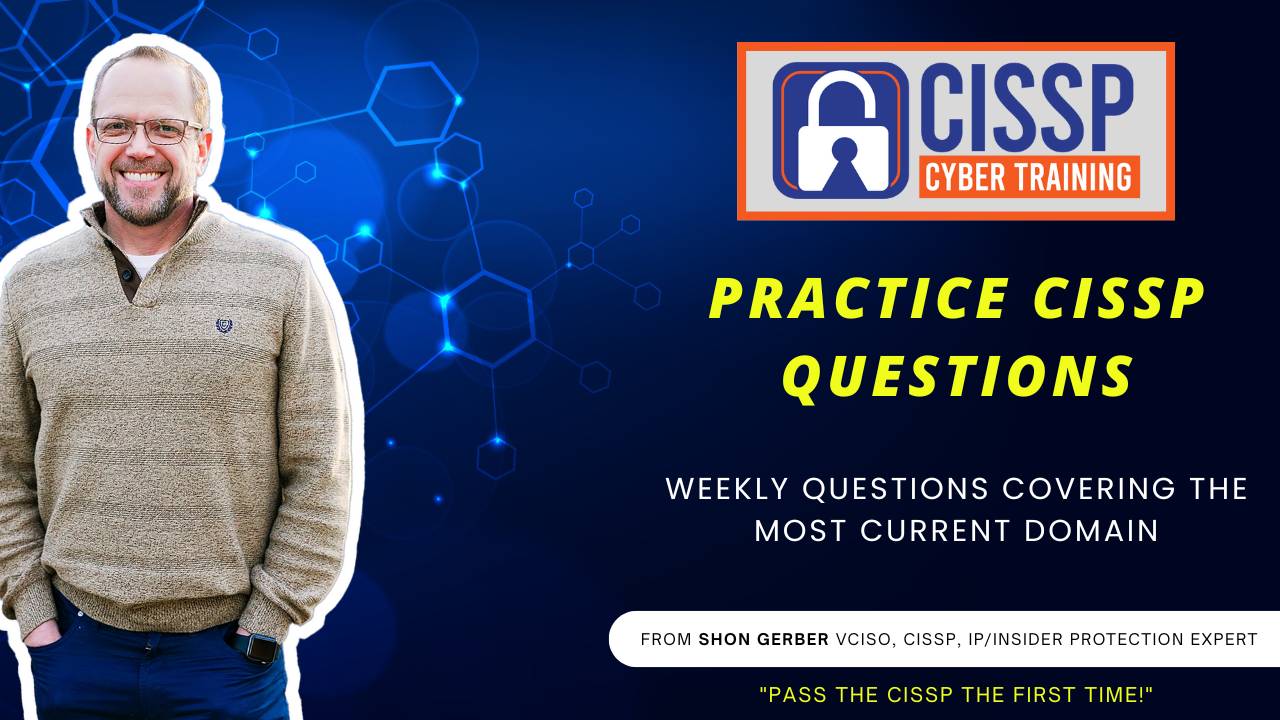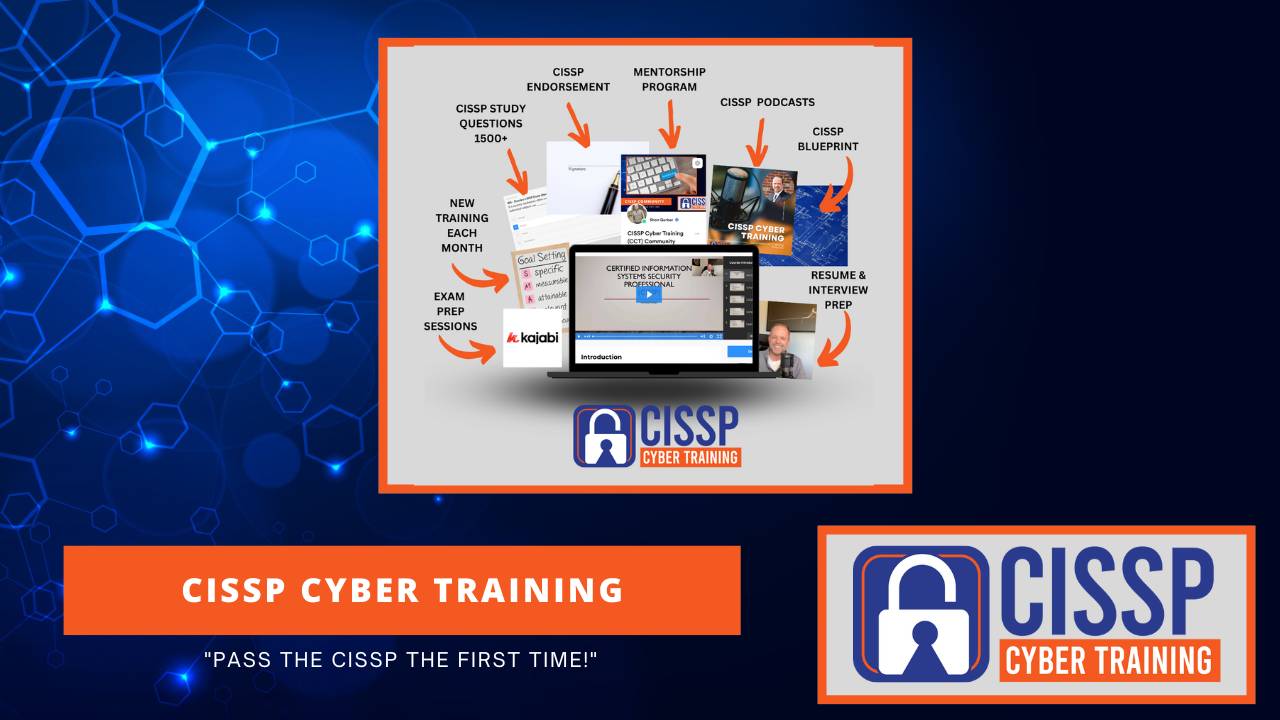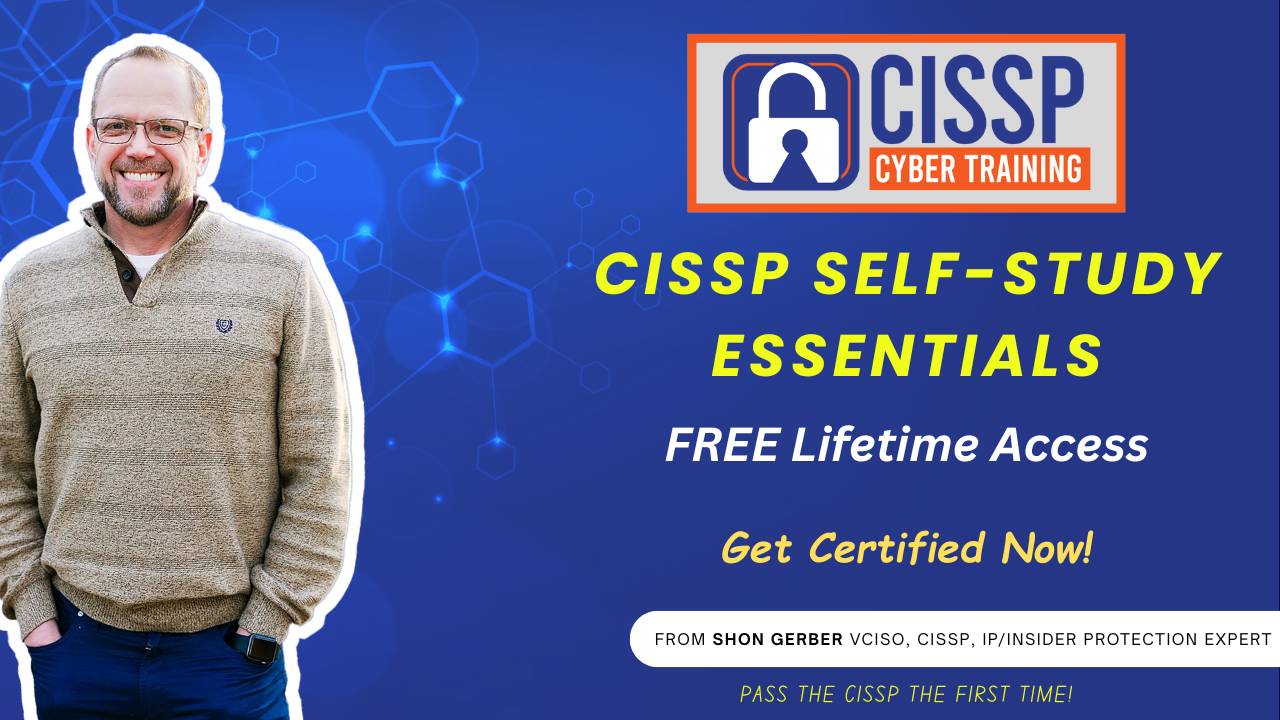CCT 161: Practice CISSP Questions - Understanding Key Cybersecurity Legislation and Career Coaching Insight
Jul 25, 2024Ever wondered what the GDPR and the Economic Espionage Act of 1996 have in common? On this episode of CISSP Cyber Training Podcast, I break down the complexities of essential cybersecurity legislation, both in the U.S. and Europe. We'll uncover what you need to know about the Identity Theft and Assumption Deterrence Act, the Wiretap Act, and the UK Computer Misuse Act. Additionally, we'll discuss the intricacies of civil law, HIPAA, and the critical role of administrative law. From the DMCA to COPA, you'll learn how these laws protect digital content and children’s online privacy, and how the RICO Act is instrumental in punishing organized crime activities.
I'm excited to share a significant update with our listeners—a brand new coaching and mentoring program designed to elevate your cybersecurity career. Drawing from my two decades of experience, including serving as a CISO, I'll provide invaluable guidance on career planning, resume preparation, and interview skills. Hear my personal journey from flying B1 bombers to becoming a cybersecurity expert, and gain insights to chart your own successful career. Head to cisspcybertraining.com to explore these new resources and take a definitive step towards achieving your professional goals.
Gain access to 60 FREE CISSP Practice Questions each and every month for the next 6 months by going to FreeCISSPQuestions.com and sign-up to join the team for Free. That is 360 FREE questions to help you study and pass the CISSP Certification. Join Today!
TRANSCRIPT
Speaker 1:
Welcome to the CISSP Cyber Training Podcast, where we provide you the training and tools you need to pass the CISSP exam the first time.
Speaker 1:
Hi, my name is Sean Gerber and I'm your host for this action-packed, informative podcast. Join me each week as I provide the information you need to pass the CISSP exam and grow your cybersecurity knowledge. All right, let's get started. Let's go. Cybersecurity knowledge. All right, let's get started. Hey all Sean Gerber with CISSP Cyber Training and I hope you guys are all having a wonderful day today. Today is CISSP Question Thursday, so today we're going to be talking about the various aspects as it relates to Domain 1 and we're going to be going over navigating contractual law, cybersecurity legislation and computer crime acts. Those are some of the questions that you may see on the CISSP and we're going to go over those as we talked about it in our podcast on Monday. All right, so we're going to get into the CISSP cyber questions of this week and it's over Domain 1. You can see this video on CISSP Cyber Training. You can go, get there and get the video. You'll be able to see it on YouTube eventually, or you just listen to this podcast. Obviously, you will be able to hear it immediately.
Speaker 1:
So let's roll into question one which US law makes identity theft a federal crime? A can spam act, b HIPAA, c identity theft and assumption deterrence act or DMCA. So when it comesA-D-A, that is what makes ita federal crime. Which European law focuses on data protection and privacy? A Data Protection Act, or C, b GDPR, c the UK Misuse Act of 1990. Or D EFTA Okay, and which European law focuses on data protection and privacy? And that is GDPR? General Data Privacy Regulation is what it is called. Question three what does the Economic Espionage Act of 1996 primarily address? A Copyright infringement, b Identity theft. What does the Economic Espionage Act of 1996 primarily address? A Copyright infringement, b Identity theft, c Theft of trade secrets or D Email spamming, and that is C Theft of trade secrets, theft of trade secrets or the misappropriation of valuable business information. That does include trade secrets underlines the importance of safeguarding your proprietary information.
Speaker 1:
Question four which law prohibits unauthorized interception of communications? A the Can't Spam Act, b the Wiretap Act, c the RICO Act or just RICO, and then D the CFAA? And the answer is the B Wiretap Act. The Wiretap Act prohibits unauthorized interception of wire, oral or electronic communications. Question five which law targets unauthorized access to computer systems? A the UK Computer Misuse Act, b the DMCA C COPA Act, b the DMCA C COPPA or D ECPA. Again, which law targets unauthorized access to computer systems? And the answer is A the UK Misuse Act of 1990. It criminalizes unauthorized access of computer systems within the UK and it sets legal boundaries for system access, especially for international operations.
Speaker 1:
Question six which type of law deals with non-criminal disputes? A administrative law, administrative law, b criminal law, c civil law or D contractual law. Okay, so what type of law deals with non-criminal disputes? And the answer is C civil law. This focuses on resolving non-criminal disputes between two parties and it's crucial for understanding. These issues, such as a breach of contract or data privacy violations, would be in the context of your CISSP and it is part of the civil law aspects and it is part of the civil law aspects.
Speaker 1:
Question seven what does CAN-SPAM Act regulate? A identity theft, b commercial emails, c electronic funds transfers or D data protection in healthcare. The CAN-SPAM Act what does it regulate? It regulates commercial emails, no-transcript, unwanted solicitations. You see this all the time in your emails and that's part of the CAN-SPAM Act. It's basically an integral part of all organization email policies and I highly recommend that you get aware of it, especially as you become a CISSP and you're doing cyber security for a company.
Speaker 1:
Question eight which law governs data protection in healthcare? A HIPAA, b, copa, c, pci, dss or D CFAA? And the answer is HIPAA A. The Health Insurance Portability Accountability Act that's a lot of words governs the protection of sensitive patient health information, particularly those that are crucial to the healthcare industry. Question nine what type of law governs public administration and regulatory agencies? A civil law, b administrative law, c criminal law or D contractual law? And the answer is B administrative law, administrative law, c Criminal law or D Contractual law, and the answer is B Administrative law. Administrative law is concerned with public administration and regulatory agencies. It is the key for ensuring policies and procedures are compliant with the governmental regulations.
Speaker 1:
Question 10. What does DMCA protect? A Trademarks, b Digital content, c Financial data or D health data. So DMCA, what does it protect? And it would be B digital content, right, it's the Digital Millennium Copyright Act, dmca, and it came out to protect digital content such as software, music and videos, etc. Etc. Not etc. Etc. Right, and so it's important for any type of media or software that you may have. The DMCA covers that.
Speaker 1:
Question 11. Which law protects children's online privacy? A COPA, b CISA, b GLBA or D EFTA? That is a acronym SUPA, and the answer is A COPA. This is the Children's Online Privacy Protection Act, and it does protect online privacy of kids under the age of 13. And it is crucial for websites and online services that are specifically aimed towards children. So my YouTube channel. They ask me all the time do you promote to kids? And so therefore, you have to look and understand would you fall under COPPA?
Speaker 1:
Question 12, what does the RICO Act provide penalties for? Okay, rico. Okay, what does it plan act provide penalties for? A data breach, b email spam, spam, c organized crime activity or d copyright infringement. So, depending upon who your political ads are right now our political person is, I think, donald trump at the time of this recording is being looked under rico whether or not that's true or not, who knows, but rico has come up and I did not know what that really was at first, because I'd heard about it but didn't really know, and then, after I understood the the acronym, I'm like oh yeah, I know that, but the RICO Act is for organized crime activity and it's what it's called is. It's a racketeering, influenced and corruption organizations. That's what RICO Act stands for, and it provides extended penalties for criminal acts performed in an ongoing organization, basically around organized crime. So that's what they're trying to go after for the former president, united states. You, you, you, you.
Speaker 1:
Question 13. Which act focuses on targeting unsolicited marketing information? A the Can Spam Act, b EFTA, c, sox or D FISMA. So which act focuses on targeting unsolicited marketing information? And again, that's Can Spam Act. It's A, b is EFTA, c is SOX or D is FISMA. And the answer is A Can Spam Act. Now, the Can Spam Act did come out a while back and it deals with penalties as far as relating to sending volumes of unsolicited email spam to consumers, and the ultimate goal was to help reduce and drop that down. This was done here in the United States, and there are various other countries that look at something very similar to it, but the ultimate goal is we all get tired of this marketing information and we want to deal with it. One of the things you can do is, obviously, they had to put this unsubscribe on the emails and that helped reduce that as well. So it gives you the ability to opt out.
Speaker 1:
Next question which act focuses on electronic funds transfers. Which act focuses on electronic funds transfers? Answer A CAN-SPAM Act, b EFTA, c SOX or D FSMA. Okay, which act focuses on electronic funds transfers and they kind of get it out of the name? Efta? Electronic fund transfers provides protections, protections to consumers engaging in electronic fund transfers and it aims to help these folks that are dealing with. You know, this electronic data editor change. One of the things that this was back in 1978, this that was a brand new, burgeoning environment market. But they had to put some levels of controls in place because data was being transferred in a digital format. But this did help reduce the help of the rights of the transfers, liabilities and responsibilities of all the participants in that network.
Speaker 1:
Question 15, which law focuses on integrity of financial reporting by corporations? A FISMA, b SOX, c PCI, dss or D GDPR? And the answer is B SOX. Sarbanes-oxley aims to protect the fraudulent financial reporting by corporations and it is crucial for your security professionals in the financial sector. You need to understand that. All right, that is all I've got for you today.
Speaker 1:
Hey, go out to CISSP Cyber Training. I'm looking to make some changes. We're actually going to be doing some coaching and mentoring for people. I think you're going to like it a lot. I have a lot of response from people that are working on their CISSP but they go.
Speaker 1:
What do I do for my career? How do I plan for that? Just expect to see some changes around this, because I know there's a definite need for it and with my background of over 20 some years of doing cybersecurity, working from all different positions all the way up to a CISO, I understand what you need. I win. I came from nothing. I was flying B1 bombers to where I'm at today. I can help you and I'm looking to provide some level of coaching out there and mentoring for you to help you get the career you want, and that includes resume prep. That includes helping you with interview questions so that you can reach and attain the goals you want financially for you and your family. All right, again, go out to cisspcybertrainingcom. Check it out. I guarantee you will love what I've got out there to help you with your CISSP and on with your future as well. Have a great day. We'll catch you on the flip side, see ya.
CISSP Cyber Training Academy Program!
Are you an ambitious Cybersecurity or IT professional who wants to take your career to a whole new level by achieving the CISSP Certification?
Let CISSP Cyber Training help you pass the CISSP Test the first time!





